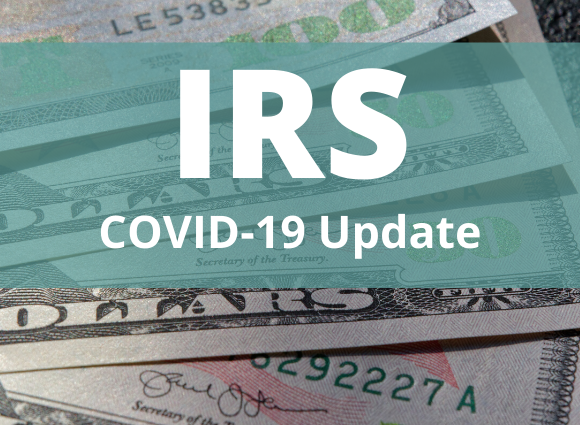
More COVID-19 Updates from the IRS
As you may have heard, the IRS has announced special federal income tax return filing and payment relief in response to the ongoing coronavirus (COVID-19) pandemic.
For a taxpayer with a federal income tax return or a federal income tax payment due on April 15, 2020, the due date for filing and paying is automatically postponed to July 15, 2020, regardless of the size of the payment owed. The relief is for:
- Federal income tax payments (including tax payments on self-employment income) for the 2019 tax year, and
- Federal estimated income tax payments (including tax payments on self-employment income) due on April 15, 2020, for the 2020 tax year.
Note: You don’t have to be sick, or quarantined, or have any other impact from COVID-19 to qualify for relief. You only need to have a federal income tax return or payment due on April 15.
After the IRS announced the relief described above, the tax agency released details of other relief that is available to certain taxpayers.
| Installment Agreements, Offers in Compromise, Audits and More
The IRS announced a series of steps to ease the burden for people who owe taxes in the wake of the COVID-19 emergency. Here are some of the highlights of the “IRS People First Initiative:” Installment Agreements. For taxpayers with existing agreements with the IRS, payments due between April 1 and July 15, 2020, are suspended. Taxpayers who are currently unable to comply with the terms of an agreement may suspend payments during this period. By law, interest will continue to accrue on unpaid balances. Offers in Compromise (OIC). An OIC is an agreement between a taxpayer and the IRS to settle a tax debt for less than the amount owed. The IRS is providing OIC relief in different ways. For example, taxpayers have the option of suspending all payments on accepted OICs until July 15. However, by law, interest will continue to accrue on any unpaid balances. Field Collection Activities. Liens and levies (including personal residence seizures) initiated by IRS field revenue officers will be suspended until July 15. However, field revenue officers will continue to pursue high-income non-filers and perform other activities if warranted. IRS audits. Until July 15, the IRS generally won’t start new field, office and correspondence audits. However, the IRS added it “may start new examinations were deemed necessary to protect the government’s interest in preserving the applicable statute of limitations.” Contact your tax advisor if you have questions about your tax bill or IRS compliance efforts. |
What About Other Federal Taxes?
According to FAQs posted on the IRS website, no deferred payment relief has yet been offered for federal payroll taxes, federal estate, and gift taxes, or federal excise taxes (as of March 25, 2020).
Exactly Which Tax Returns Can Be Deferred?
The IRS stated that the deadline to file the following returns that would otherwise be due on April 15 is postponed to July 15:
- 2019 Form 1040 individual federal income tax returns,
- 2019 Form 1120 federal income tax returns for C corporations that use the calendar year for tax purposes, and
- 2019 Form 1041 federal income tax returns for trusts and estates that use the calendar year for tax purposes.
What About Other Federal Tax Returns?
The filing deadlines for federal payroll tax returns, federal estate, and gift tax returns, federal excise tax returns, and federal information returns (such as W-2s and 1099s) are unchanged (as of March 25, 2020).
What about the IRA and HSA Contribution Deadlines?
The IRA and health savings account (HSA) contribution deadlines for the 2019 tax year are also postponed until July 15.
What About Estimated Federal Income Tax Payments Due on June 15?
No relief has yet been offered to taxpayers with June 15 deadlines for making their second quarterly estimated federal income tax payments for the 2020 tax year (as of March 25, 2020).
What About Extending 2019 Returns Beyond July 15?
According to the IRS FAQs, you must follow the normal procedure to extend a calendar-year federal income tax return for 2019 that would now otherwise be due on July 15 (as of March 25, 2020). That involves individuals filing Form 4868 (Form 7004 for C corporations and trusts and estates).
What About my State Returns?
At this time, some states have followed suit on deferring payments and delaying the filing deadline but may not have delayed the deadline for first quarter estimates. For instance, Kansas has postponed the 2019 filing and balance due deadline until July 15th. However, the first quarter 2020 Kansas estimate payment is still due on 4/15/2020.
If you have questions about filing your return or paying tax, contact your tax advisor.
This content was created during a snapshot in time and should be relied upon as such. Legislation and guidance continue to change as we progress through the current fluid environment and the information may not be applicable at a later date. All content and materials are for general information purposes only. If you have questions regarding your specific situation, please contact us.



